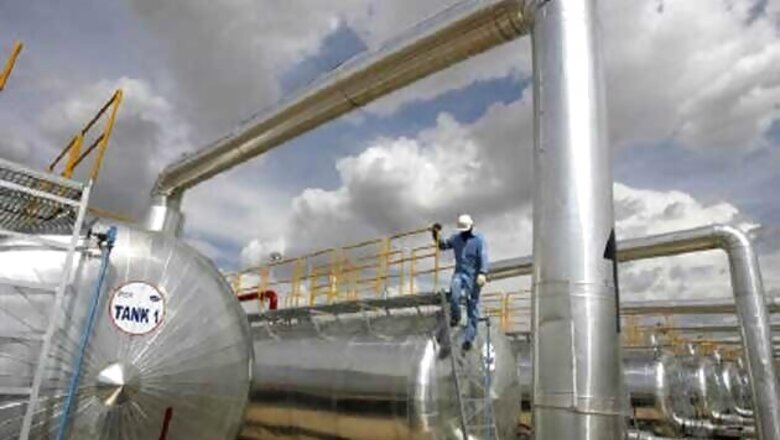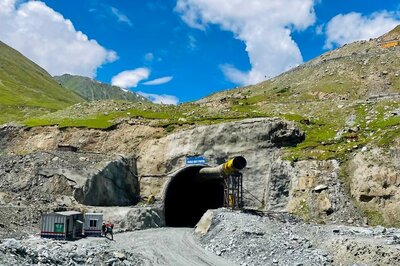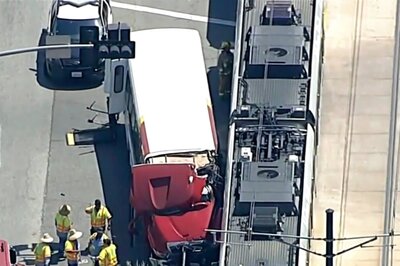
views
New Delhi: Taking advantage of lower oil prices, the government on Monday allocated Rs 4,948 crore to full India's maiden strategic oil reserves to insulate itself from supply disruptions. India, which is 79 per cent dependent on imports to meet its crude oil needs, is building emergency stockpiles with millions of barrels of crude that mirror the reserves that the US and its western allies amassed after the first oil crisis of 1973 to 1974.
Underground storages are being built at Visakhapatnam in Andhra Pradesh and Mangalore and Padur in Karnataka to store about 5.33 million tonnes (28 million barrels) of crude oil. This is enough to meet nation's oil requirement for 11 days.
Briefing reporters about the decisions taken by the Cabinet Committee on Economic Affairs (CCEA), Telecom and IT Minister Ravi Shankar Prasad said, "Rs 4,948 crore allocation for Gross Budgetary Support (GBS) to the scheme for the Indian Strategic Storage Programme for storage of crude oil by Indian Strategic Petroleum Reserves Ltd (ISPRL) as been approved."
This money would be used to buy crude to fill up the just completed Visakhapatnam (Vizag) storages. Indian Oil Corp (IOC) this week already bought two ship loads of Iraqi crude to fill this storage and the Cabinet sanction would allow payments to be made for the purchase.
Visakhapatnam facility would have the capacity to store 1.33 million tonnes of crude oil in underground rock caverns. Huge underground cavities almost ten storey tall and approximately 3.3 km long are being built.
A similar facility in Mangalore will have a capacity of 1.55 million tonnes and would be mechanically completed by June 2015. A 2.5-million tonnes storage at Padur, near Mangalore, would be completed by July, he said.
The Finance Ministry has provisioned Rs 2,399 crore in the Supplementary Demands for Grants for buying crude oil to fill the Vizag facility. This money was enough to buy 6.5 million to 7 million barrels of crude as against Vizag capacity to hold 10 million barrels of crude.
Against this backdrop, the CCEA sanctioned a larger sum of Rs 4,948 crore which would be used to meet "the entire cost for filling crude oil in Visakhapatnam cavern," he said. Any money left after filling Vizag, would be used "for filling up the strategic part of the caverns which are being constructed at Mangalore and Padur," he said.
As this money would not be sufficient to meet the filling cost, the Ministry of Petroleum and Natural Gas has been asked to continue exploring alternative models for financing the remaining cost to fill the Mangalore and Padur caverns.
"This will include commercial utilisation by other interested parties," an official statement said. With the commissioning of Visakhapatnam storage, India will join nations like the US, Japan and China that have strategic reserves. These nations use the stockpiles not only as insurance against supply disruptions but also to buy and store oil when prices are low and release them to refiners when there is a spike in global rates.
The official said India plans to use strategic reserves to offset the risk of a disruption in supplies, mostly from the Middle East and North Africa. Western countries have used their strategic reserves only three times over the past 35 years, during the first Gulf War in Iraq in 1991, after hurricane Katrina in 2005 and in 2011, after the start of the war in Libya.
"We have been facing the problem in strategic reserve of crude oil. At times, there is impact on crude oil due to international developments. At times, there is impact on crude oil due to either abundant supply or scarcity," Prasad said.
So, it was decided to strengthen the strategic storage of crude oil. "A need for felt long time because a very substantial part of our fuel economy is based on imports. Therefore to prevent from vagaries of international tense situation otherwise, it was felt that there was need to improve our strategic storage of crude oil," he said.
The storage "will insulate India's crude oil economy from vagaries of international disruptions," he added. The money sanctioned would also be to meet the annual operations and maintenance (O&M) costs of Rs 47 crore for the Vishakhapatnam storage and Rs 179 crore for all three caverns.
"This excludes the cost of security, which will be provided by the Government, in view of their essential strategic nature for meeting the energy security needs of the country," the statement said.
"This decision will facilitate in dealing with the situation of any disruption in the supply chain of crude oil and abnormal spike in world oil prices," it added.


















Comments
0 comment